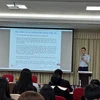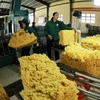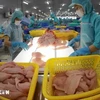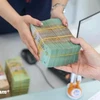Wholesale markets and distributors in Ho Chi Minh City have plans in place to boost sales of lychee, a city leader told a meeting in HCM City on June 10.
Nguyen Thi Hong, People's Committee deputy chairwoman, said last year the city had consumed 60,000 tonnes, or 50 percent of the nation's total.
About 80,000 tonnes are expected to be sold in the city this year, she said, adding that wholesalers and retailers had met with businesses in Hai Duong and Bac Giang provinces to discuss transport of the fruits to the south.
According to the Ministry of Industry and Trade, the country's lychee output is likely to top 200,000 tonnes this year, with 40 percent being exported.
Trinh Diep Thanh Thao, deputy director of the Thu Duc Wholesale Market, said the market has set up three new stalls to sell lychee after getting 11,500 tonnes in the period between May 17 and June 9.
Co-opMart supermarket chain expects to sell 800 tonnes of lychees this year.
It now sells 10-15 tonnes daily and the volume could reach 30 tonnes at times, Nguyen Thi Thu Thuy, deputy general director of Sai GonCo.op, said, adding that the supermarket offers promotions to boost consumption.
Ho Quoc Nguyen, Big C's public relations director, said the supermarket is likely to sell more than 300 tonnes this year and it too offers promotions.
Previously, Hanoi authorities also said that they will soon grant trading licences to lychee traders in Hai Duong Province so they can open mobile lychee shops at vacant places in Hanoi.
At the meeting in HCM City, authorities also called on lychee farmers to adopt VietGap and Global-Gap standards on more areas to improve the quality of their fruits and meet hygiene and food safety requirements in both domestic and export markets.
Hong said lychee is now mainly consumed as fresh fruit, and so preservation methods to keep it fresh for longer are needed.
Besides, research should be done into processing fresh lychee so that a spike in supply after a harvest would not send prices crashing, she said.
Thao said businesses should pay attention to packaging and building brands for the fruit.
Deputy Minister of Industry and Trade Tran Tuan Anh said building a value chain for the fruit is very important.
Also on June 10, with the shipment of more than three tonnes of lychees to Australia and two tonnes to the US, Rong Do Company was the second company to export lychees to the US and the first Vietnamese company to ship the fruit to Australia.
Robert Guillermo, pre-clearance specialist with the US Department of Agriculture, who inspected the shipment, said the lychee quality met the standards for export to the US market.
"It is fresh and sweet, and meets the quality standard," he said. "We have had two previous shipments sent to the US. They were the same quality as this one," Guillermo said.
He predicted that the volume of lychees exported to the US would increase sharply in the near future, depending on the state of the US economy.
Alex Alexopoulos, national sales manager for PanasiaFresh, which imports litchis from Vietnam and sells them in Australia, said he is satisfied with the quality of the lychees in Vietnam and that the packaging facility is very good.
All of the lychees will be sold in wholesale markets and supermarkets in Australia. After this first shipment, his company plans to buy as much as possible if customers in Australia like the Vietnamese lychees.
"We hope this season we can import 15 to 20 tonnes of lychees every week for distribution in Australia," Alexopoulos said, adding his company also plans to import coconut, mango and dragon fruit from Vietnam.
Deputy Trade Minister Tuan Anh said his ministry will work with the ministries of Agriculture and Rural Development and Science and Technology to fix quality standards for fruits, including lychee.
It will also work with relevant ministries to find packaging and post-harvest solutions, he said.
Authorities from BacGiang and Hai Duong provinces said they will increase the area under lychee adopting VietGap and GlobalGap standards to improve quality.
Nguyen Doan Quang, director of the Hai Duong Department of Industry and Trade, said the province will strive to ensure safe production processes are adopted on 50 percent of the cultivation area by 2020, including VietGap and GlobalGap standards on 20-30 percent.-VNA
Nguyen Thi Hong, People's Committee deputy chairwoman, said last year the city had consumed 60,000 tonnes, or 50 percent of the nation's total.
About 80,000 tonnes are expected to be sold in the city this year, she said, adding that wholesalers and retailers had met with businesses in Hai Duong and Bac Giang provinces to discuss transport of the fruits to the south.
According to the Ministry of Industry and Trade, the country's lychee output is likely to top 200,000 tonnes this year, with 40 percent being exported.
Trinh Diep Thanh Thao, deputy director of the Thu Duc Wholesale Market, said the market has set up three new stalls to sell lychee after getting 11,500 tonnes in the period between May 17 and June 9.
Co-opMart supermarket chain expects to sell 800 tonnes of lychees this year.
It now sells 10-15 tonnes daily and the volume could reach 30 tonnes at times, Nguyen Thi Thu Thuy, deputy general director of Sai GonCo.op, said, adding that the supermarket offers promotions to boost consumption.
Ho Quoc Nguyen, Big C's public relations director, said the supermarket is likely to sell more than 300 tonnes this year and it too offers promotions.
Previously, Hanoi authorities also said that they will soon grant trading licences to lychee traders in Hai Duong Province so they can open mobile lychee shops at vacant places in Hanoi.
At the meeting in HCM City, authorities also called on lychee farmers to adopt VietGap and Global-Gap standards on more areas to improve the quality of their fruits and meet hygiene and food safety requirements in both domestic and export markets.
Hong said lychee is now mainly consumed as fresh fruit, and so preservation methods to keep it fresh for longer are needed.
Besides, research should be done into processing fresh lychee so that a spike in supply after a harvest would not send prices crashing, she said.
Thao said businesses should pay attention to packaging and building brands for the fruit.
Deputy Minister of Industry and Trade Tran Tuan Anh said building a value chain for the fruit is very important.
Also on June 10, with the shipment of more than three tonnes of lychees to Australia and two tonnes to the US, Rong Do Company was the second company to export lychees to the US and the first Vietnamese company to ship the fruit to Australia.
Robert Guillermo, pre-clearance specialist with the US Department of Agriculture, who inspected the shipment, said the lychee quality met the standards for export to the US market.
"It is fresh and sweet, and meets the quality standard," he said. "We have had two previous shipments sent to the US. They were the same quality as this one," Guillermo said.
He predicted that the volume of lychees exported to the US would increase sharply in the near future, depending on the state of the US economy.
Alex Alexopoulos, national sales manager for PanasiaFresh, which imports litchis from Vietnam and sells them in Australia, said he is satisfied with the quality of the lychees in Vietnam and that the packaging facility is very good.
All of the lychees will be sold in wholesale markets and supermarkets in Australia. After this first shipment, his company plans to buy as much as possible if customers in Australia like the Vietnamese lychees.
"We hope this season we can import 15 to 20 tonnes of lychees every week for distribution in Australia," Alexopoulos said, adding his company also plans to import coconut, mango and dragon fruit from Vietnam.
Deputy Trade Minister Tuan Anh said his ministry will work with the ministries of Agriculture and Rural Development and Science and Technology to fix quality standards for fruits, including lychee.
It will also work with relevant ministries to find packaging and post-harvest solutions, he said.
Authorities from BacGiang and Hai Duong provinces said they will increase the area under lychee adopting VietGap and GlobalGap standards to improve quality.
Nguyen Doan Quang, director of the Hai Duong Department of Industry and Trade, said the province will strive to ensure safe production processes are adopted on 50 percent of the cultivation area by 2020, including VietGap and GlobalGap standards on 20-30 percent.-VNA



















